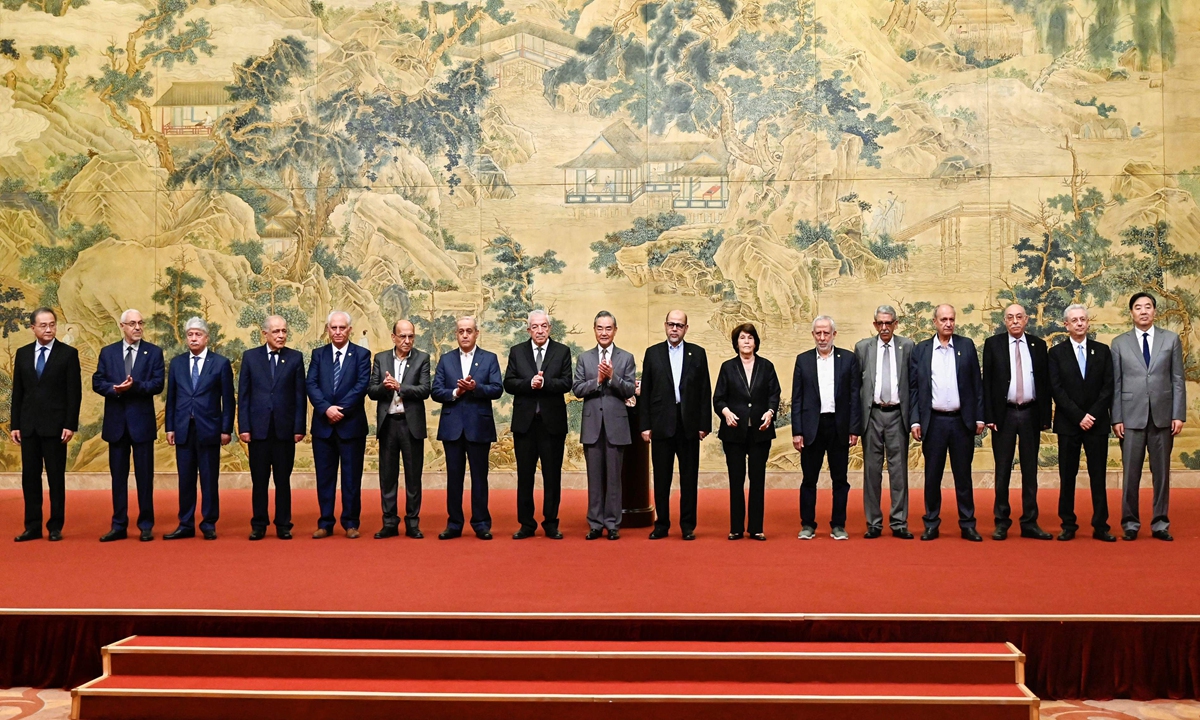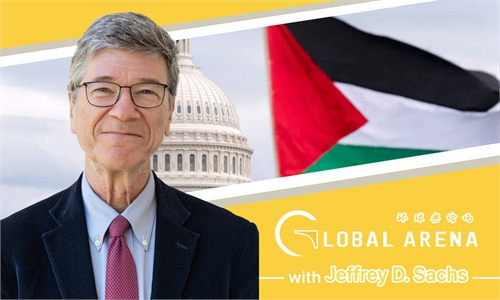International community hails Beijing Declaration
Shrugging off Western naysayers, FM says ‘to never lose faith in peace’

Chinese Foreign Minister Wang Yi, also a member of the Political Bureau of the Communist Party of China Central Committee, attends the closing ceremony of a reconciliation dialogue among Palestinian factions and witnesses the signing of a declaration on ending division and strengthening unity by 14 Palestinian factions, in Beijing, capital of China, July 23, 2024. Photo: VCG
Following the historic handshake between Saudi Arabia and Iran in Beijing last spring, another epoch-making event, the signing of the Beijing Declaration by 14 Palestinian factions on ending division and strengthening unity, seems to affirm China's role as a "peacemaker."
The move was widely recognized and welcomed by the international community including the UN and the European Union, with experts hailing it as "a key milestone" in settling the Palestinian issue some nine months into the ongoing warfare that plagues the Gaza Strip.
The prolonged lack of any effective solutions to the Palestinian-Israeli conflict, experts said, is due to the deep divisions among various Palestinian factions, making it difficult to negotiate with Israel as a unified whole.
Analysts pointed out that the rare gathering of 14 Palestinian factions in Beijing demonstrates China's increasing influence in the Middle East, as its active and just role in promoting peace and dialogue is gaining more trust among regional countries, in stark contrast to the US.
Chinese Foreign Minister Wang Yi met with the head of the Fatah delegation Mahmoud al-Aloul in Beijing on Tuesday, according to the Xinhua News Agency.
Wang, also a member of the Political Bureau of the Communist Party of China Central Committee, stressed that no matter how the international situation changes, China will always firmly support the just cause of the Palestinian people.
Noting that the conflict in Gaza has caused an enormous humanitarian disaster, Wang said to resolve this historical injustice, the principle of "Palestinian-owned, Palestinian-led and Palestinian-ruled" must be upheld.
Mahmoud al-Aloul, deputy chief of the Fatah Movement, thanked China for its efforts to promote reconciliation among Palestinian factions and its support and assistance to Palestine over the past decades, calling China a true friend and brother of the Palestinian people.
UN Secretary-General Antonio Guterres welcomed the Beijing Declaration shortly after its signing, and expressed his appreciation for the diplomatic efforts being made by China in facilitating the process, Stephane Dujarric, spokesperson for the UN chief, said on Tuesday.
Terming the deal as "an important step toward furthering Palestinian unity," Dujarric said the secretary-general "encourages all factions to overcome their differences through dialogue and urges them to follow up on the commitments that were made in Beijing and the declaration they signed on to."
EU Special Representative for the Middle East Peace Process Sven Koopmans also extended congratulations on China's successful mediation during a phone call with China's special envoy on the Middle East Issue Zhai Jun on Tuesday.
Koopmans stressed it is a remarkable achievement and fully demonstrates China's positive and constructive role in the Middle East peace process, noting that the EU looks forward to further strengthening communication with China, jointly pushing for a cease-fire and the settlement of the Palestinian question on the basis of the "two-state solution."
Ding Long, a professor with the Middle East Studies Institute of Shanghai International Studies University, described the achievement as finding the "greatest common denominator." Through this reconciliation dialogue, all Palestinian factions recognize the Palestine Liberation Organization (PLO) as the sole legitimate representative of the Palestinian people. This lays the foundation for unity and stability within Palestine, Ding told the Global Times.
In recent years, the international community has become pessimistic about any resolution to the Palestinian issue. "External countries were unenthusiastic, so were Arab countries, and even within Palestine, there was little hope," said Ding. "It highlighted China's tremendous political courage and diplomatic efforts in getting them to sit together this time for a chat."
Zhu Yongbiao, executive director of the Research Center for the Belt and Road at Lanzhou University, told the Global Times on Wednesday that the Beijing Declaration is pointing a direction and offering guidelines, rather than an executive manual.
Experts suggested that the timing of such unity reflects that intra-Palestinian factions have decided to adopt a more practical attitude about internal rifts and the establishment of an independent Palestine state.
Despite wide recognition from the international community on this major reconciliation progress, some Western media and politicians have not given up on speaking ill of the development.
Reuters on Tuesday cited analysts saying the agreement would "prove hard to implement," with complications including the deep enmity between Palestinian factions and Western opposition to Hamas having any role in governance.
Responding to such "concerns," the Chinese Foreign Ministry spokesperson Mao Ning said the latest development has "brought hope and a future to the Palestinian people." Only by continuously consolidating consensus and putting it into practice can the reconciliation process become more concrete, and internal unity stronger.
"Peace will not be accomplished overnight, but as long as the effort is in the right direction, we must keep at it and never lose faith," Mao noted. China will continue to support the Palestinian people in restoring their legitimate national rights and support the people of countries in the Middle East in controlling their own destiny, the spokesperson added.
According to the AP, Israel said it rejects Hamas' involvement in the governance of Gaza after the war.
Hamas previously said it might be willing to play no role in Gaza's post-war governance and has sought agreement with Fatah on a post-war, technocratic Palestinian Authority government, media reported.
Zhu said rejection of Hamas in a post-war government may be more of an excuse to oppose the reconciliation itself.
Israel has also rejected US calls for the Palestinian Authority to govern Gaza after the fighting ends, though it has not presented a cohesive postwar vision of its own, the AP reported.
As the US is having a strategic contraction in the Middle East and its response to the nine-month Gaza conflict has disappointed and angered many Muslims, China's mediation seems "ever more precious," Zhu said. "The US, which does not have the ability to offer such a negotiation platform, does not have the right to point fingers at China," he said.

